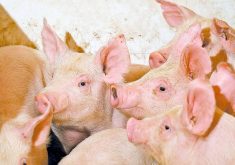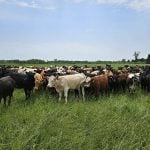Federal officials in Canada and the U.S. have agreed on zone defense, so to speak, to allow safe trade of hogs and pork products if African swine fever should turn up in hogs in either country.
Canada’s chief veterinary officer Dr. Jaspinder Komal and U.S. CVO Dr. Jack Shere said Wednesday the two countries have worked to “modify” export certificates to allow trade of live swine, swine semen, pet food and animal byproducts and meat to continue in “approved disease-free zones” in case of an ASF outbreak.
Read Also

U.S. grains: Soybean futures set two-week high on US weather worry, soyoil rally
Chicago Board of Trade soybean futures touched a two-week high on Friday on worries that heat may threaten U.S. crops and expectations that the country’s biofuel policy would boost demand for soyoil, analysts said.
If a case of ASF is identified, geographic boundaries would be used to create control zones to contain the outbreak. “The areas outside of these control zones are disease-free zones,” the two CVOs said in a statement.
Zoning systems allow trade constraints to be limited to “discrete geographic areas,” rather than applied to all exports of a commodity from anywhere in Canada, regardless of where the disease originates, as was the case during the BSE crisis.
A zoning system, for example, was successfully applied in Canada in December 2014 during the outbreak of high-path avian influenza in British Columbia. Other countries have used zoning to maintain exports during outbreaks of avian flu and foot-and-mouth disease.
The use of zoning in B.C.’s H5N2 bird flu outbreak followed a Canada-U.S. agreement in 2013 on an approach for mutual recognition of zones.
In practice, the governments said at the time, if the Canadian Food Inspection Agency were to identify a specific geographic zone as infected, the U.S. Department of Agriculture would continue to allow imports of live animals, animal products and byproducts from areas of Canada deemed disease-free.
Once Canada releases the affected zone, the U.S. would allow trade to resume from that area, and vice-versa for zones established in a U.S. outbreak.
The two CVOs said Wednesday the new ASF agreement builds on Canada and U.S. zoning arrangements set up by CFIA and USDA last Aug. 15, which further “set out principles for zoning and trade.”
‘Global threat’
ASF is a rapid-spreading viral disease of both domestic and wild pigs, present mainly in sub-Saharan Africa up until about 2007, spreading into central Asia and parts of Europe and arriving in China, the world’s largest pork-producing country, in August last year.
The disease causes fever and internal bleeding in infected hog populations, with death rates of up to 100 per cent in hog populations infected with severe strains. Treatments and effective vaccines remain unavailable.
ASF only affects members of the pig family and is not considered a food safety risk. However, the virus can survive for several months in fresh pork and processed pork products, and can also survive for long periods outside a host pig, allowing it to be spread via contaminated objects such as feed, farm equipment, clothes and footwear.
Komal and Shere, in Wednesday’s statement, described ASF as a “global threat” that “cannot be addressed in isolation.”
They noted zoning and safe trade were emphasized by representatives attending the international ASF Forum held April 30 to May 1 in Ottawa, and supported also by leaders from Mexico, the European Union, the United Nations’ Food and Agriculture Organization (FAO) and the World Organization for Animal Health (OIE) along with provincial, territorial and state partners and industry groups. — Glacier FarmMedia Network














